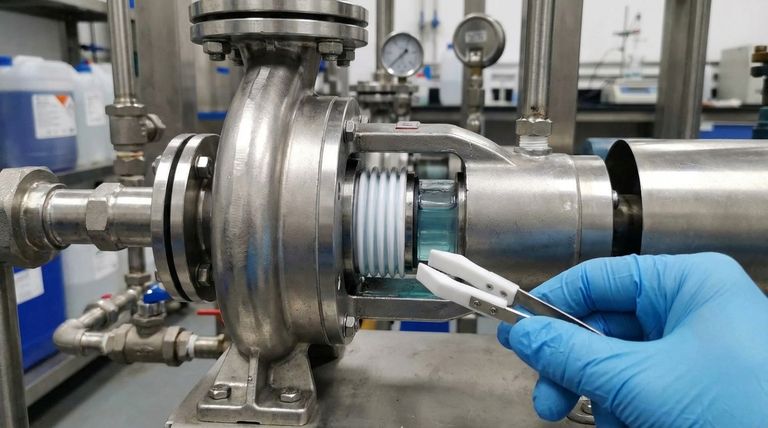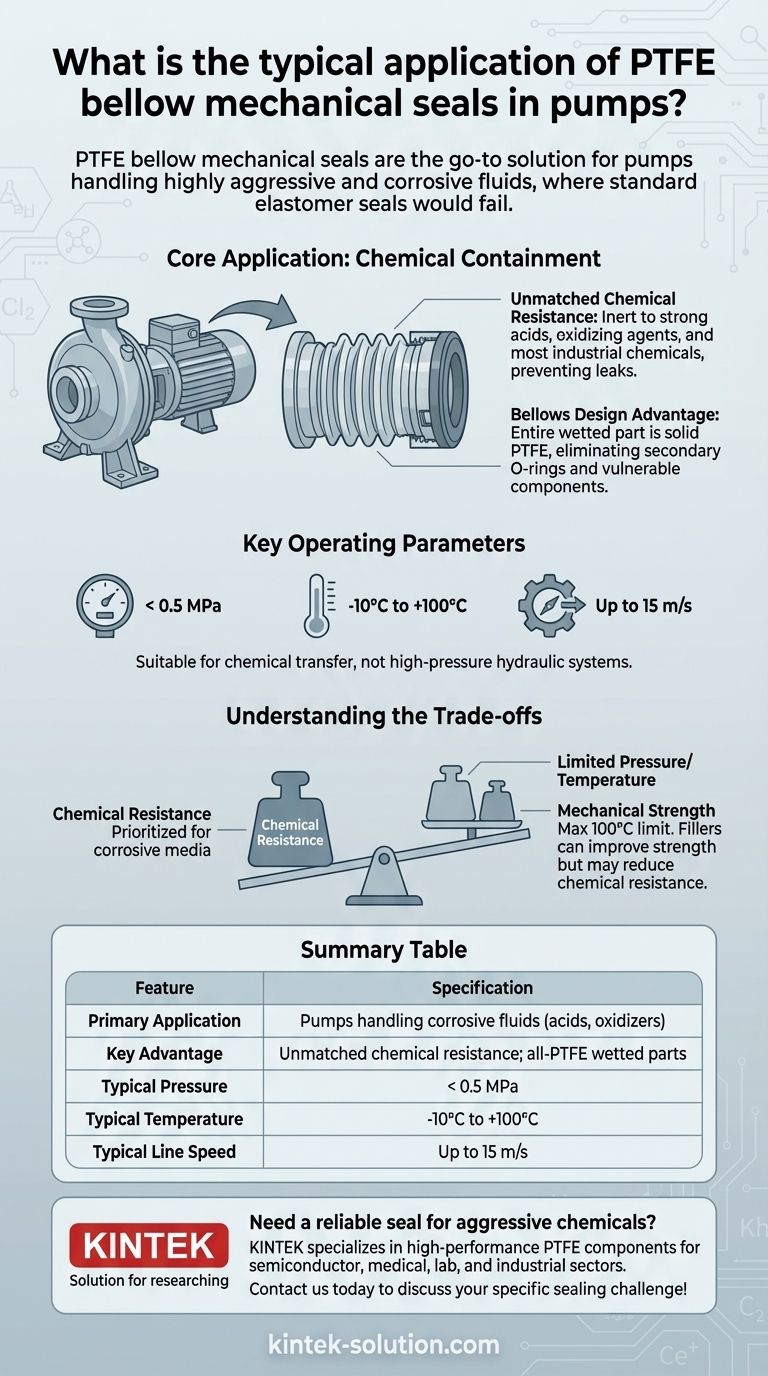To put it simply, PTFE bellow mechanical seals are the go-to solution for pumps handling highly aggressive and corrosive fluids. Their primary application is within corrosion-resistant pumps where standard elastomer seals would quickly degrade and fail. This specialization is due to PTFE's near-universal chemical inertness.
The core value of a PTFE bellow mechanical seal is its ability to provide reliable sealing in chemically hostile environments. While other materials offer better mechanical properties, none can match PTFE's resistance to strong acids, oxidizing agents, and other corrosive media, making it indispensable in the chemical processing industry.

The Core Application: Chemical Containment
The defining characteristic of a PTFE bellow seal is its exceptional ability to withstand chemical attack. This makes it the default choice for specific, challenging industrial pumping applications.
Unmatched Chemical Resistance
The primary reason to specify a PTFE bellow seal is its material composition. PTFE (Polytetrafluoroethylene) is inert to almost all industrial chemicals, including strong acids and powerful oxidizing agents.
This property ensures the seal maintains its integrity and prevents leaks when pumping fluids that would destroy conventional seal materials like rubber or other plastics.
The Advantage of the Bellows Design
The "bellow" in the seal's name refers to its flexible, accordion-like structure. This design is critical because it allows the entire wetted part of the seal to be made from solid PTFE.
This eliminates the need for secondary elastomeric O-rings, which would otherwise be a weak point in the chemical resistance chain. The result is a sealing system with no vulnerable components exposed to the corrosive media.
Key Operating Parameters
While chemically robust, these seals operate within a well-defined window of physical conditions. Understanding these limits is crucial for successful application.
Typical Operating Window
Standard PTFE bellow seals are not designed for high-pressure or high-temperature service. Their typical specifications are:
- Pressure: Below 0.5 MPa
- Temperature: -10°C to +100°C
- Line Speed: Up to 15 m/s
These parameters make them suitable for many chemical transfer and processing applications but unsuitable for high-performance hydraulic systems.
Multi-Spring Structure
These seals often feature a multi-spring design. This arrangement distributes the closing force more evenly across the seal faces compared to a single large spring, leading to more reliable performance and a more stable seal.
Understanding the Trade-offs
Choosing a PTFE bellow seal means prioritizing chemical resistance over mechanical performance. This decision comes with important trade-offs.
Limited Pressure and Temperature
The most significant limitation is the low pressure and temperature tolerance. While the raw PTFE material can withstand very high temperatures (up to 260°C / 500°F), the bellow seal's design and construction limit its operational range to around 100°C. Exceeding these limits can cause the bellow to lose its mechanical integrity.
Mechanical Strength Considerations
Pure PTFE is a relatively soft material. For applications with higher mechanical demands, fillers like carbon or bronze can be added to the PTFE compound to improve its strength and wear resistance.
However, using a filled PTFE can sometimes slightly reduce its universal chemical resistance. This is a critical engineering trade-off that must be carefully evaluated for the specific fluid being pumped.
Making the Right Choice for Your Goal
Selecting the correct seal requires matching its unique characteristics to your specific operational needs.
- If your primary focus is handling highly corrosive media: The PTFE bellow mechanical seal is the default choice, offering unparalleled chemical compatibility.
- If your application involves high pressure (>0.5 MPa) or high temperature (>100°C): You must seek alternative sealing solutions designed for more demanding physical conditions.
- If your fluid is both corrosive and contains abrasive particles: Investigate a filled PTFE variant, but be sure to verify its chemical compatibility against your specific media.
Ultimately, choosing the right seal is about understanding that a material's greatest strength often defines its specific limitations.
Summary Table:
| Feature | Specification |
|---|---|
| Primary Application | Pumps handling corrosive fluids (acids, oxidizers) |
| Key Advantage | Unmatched chemical resistance; all-PTFE wetted parts |
| Typical Pressure | < 0.5 MPa |
| Typical Temperature | -10°C to +100°C |
| Typical Line Speed | Up to 15 m/s |
Need a reliable seal for aggressive chemicals? KINTEK specializes in manufacturing high-performance PTFE components, including custom bellow mechanical seals for the semiconductor, medical, laboratory, and industrial sectors. We ensure precision and chemical compatibility from prototype to high-volume production. Contact us today to discuss your specific sealing challenge!
Visual Guide

Related Products
- Custom PTFE Parts Manufacturer for Teflon Parts and PTFE Tweezers
- Custom PTFE Sealing Tapes for Industrial and High Tech Applications
- Custom PTFE Parts Manufacturer for Teflon Containers and Components
- Custom PTFE Sleeves and Hollow Rods for Advanced Applications
- Custom PTFE Square Trays for Industrial and Laboratory Use
People Also Ask
- What finishing techniques are effective for machined Teflon parts? Achieve Functional Performance and Dimensional Stability
- What fabrication services are available for PTFE? Shearing, Stamping, Laser Cutting, Molding & Machining
- What factors should be considered when choosing between Nylon and PTFE? Select the Right Material for Your Application
- What industrial benefits do PTFE-machined parts offer? Achieve Peak Performance in Demanding Applications
- What chemical processing applications involve PTFE-machined parts? Essential Components for Corrosive & High-Purity Systems



















